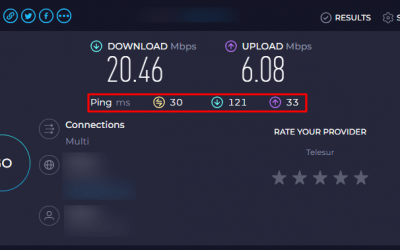Test your current internet speed
Before you get started, test your current internet speed. Use your speed test result as a baseline and compare the results as you go through your journey on reaching a faster internet connection.
SpeedtestWhen it comes to connecting to the internet, most of us have a range of options available to us. From WiFi and Ethernet to satellite and broadband, there are numerous different ways to get online.
But when it comes to choosing the stylish type of internet connection for your requirements, two options tend to stand out wireless and wired.
In this post, we’ll be comparing wireless and wired internet speeds to help you decide which is the right choice for you.
First, let’s define what we mean by “wireless” and “wired” internet.
Wireless internet, also known as WiFi, refers to any type of internet connection that uses radio waves to transmit data between devices and a router. This means that you can connect to the internet without the need for physical wires.
WiFi is the most common type of wireless internet, and it can be set up in homes, businesses, and public places like coffee shops and airports.
Wired internet, on the other hand, refers to any type of internet connection that uses physical cables to transmit data. The most common type of wired internet is Ethernet, which uses a network of lines to connect devices to a router or modem.
Ethernet is frequently used in office or home networking surroundings, where a stable and fast connection is needed.
Now that we have a basic understanding of wireless and wired internet, let’s compare their speeds.
When it comes to comparing wireless and wired internet speeds, there are many crucial factors to consider. One of the main factors is the distance from the router. In general, the further you’re from the router, the slower your internet speeds will be. This is because wireless signals tend to weaken over distance, and can also be affected by physical barriers similar to walls and floors.
Another factor that can affect internet speed is the number of devices that are connected to the network. The further devices that are connected, the further strain there will be on the network, and the slower the speed will be. This is especially true for wireless networks, as they’re generally designed to support a lower number of devices than wired networks.
Interference is another factor that can affect internet speeds. Wireless signals can be disintegrated by other electronic devices that use the same frequency, similar to cordless phones and microwave oven ranges. This can affect slower speeds or indeed a complete loss of connection. Wired connections, on the other hand, aren’t affected by hindrance in the same way, as the data is transmitted through physical lines rather than over the air.
So, based on these factors, which type of internet connection is faster: wireless or wired?
The answer isn’t always straightforward, as the factual speeds will depend on the specific circumstances of each scenario. still, in general, wired connections tend to be faster than wireless connections. This is because wired connections aren’t affected by distance or hindrance in the same way that wireless connections are.
That being said, it’s important to note that advances in technology have made wireless connections much faster and more dependable in recent times. ultramodern WiFi routers are able of delivering high-speed internet to devices that are fairly close to the router, and newer wireless norms( similar to WiFi 6) offer indeed faster speeds and better content.
So, while wired connections may be generally faster, there is still a plenitude of situations where wireless internet is the better choice. For illustration, if you need to connect to the internet in a room that’s far from the router, or if you need to connect a device that doesn’t have an Ethernet harborage, also a wireless connection might be the more accessible option.
Another factor to consider when choosing between wireless and wired internet is cost. In general, wired internet tends to be more expensive to install and maintain than wireless internet. This is because it requires the use of physical cables, which need to be run through walls, floors, and ceilings.
Wireless internet, on the other hand, is generally easier and cheaper to set up, as it doesn’t bear any calbes. All you need is a router and a device with a wireless appendage( similar to a laptop or smartphone), and you can connect to the internet from anywhere within range of the router.
Another advantage of wireless internet is convenience. With a wireless connection, you can connect to the internet from anywhere within range of the router, without the need for cables. This makes it easy to move your device around and use the internet in different areas of your home or office.
Wired internet, on the other hand, is generally more dependable than wireless internet, as it isn’t affected by hindrance in the same way. This makes it a good choice for situations where a stable and fast connection is essential, similar to online gaming or streaming high-description video.
When it comes to security, both wireless and wired internet have their pros and cons. Wireless networks can be more vulnerable to hacking and other types of cyber attacks, as the data is transmitted over the air and can potentially be interdicted by vicious actors. still, there are ways you can take to secure your wireless network, similar to using a strong password and enabling encryption.
Wired networks, on the other hand, are generally considered to be more secure than wireless networks, as the data is transmitted through physical cables rather than over the air. still, this doesn’t mean that wired networks are fully secure, as they can still be vulnerable to attacks similar to a man-in-the-middle attack and physical tampering.
Conclusion
In conclusion, both wireless and wired internet have their advantages and disadvantages when it comes to speed, cost, convenience, trustability, and security. The best choice for you’ll depend on your specific requirements and circumstances.
Still, also a wired connection is likely the best choice If you need a fast and stable connection for conditioning similar to online gaming or streaming high-definition video.
still, if you need a more accessible and flexible option, or if you can don’t have the capability to run lines, also a wireless connection might be the better choice.
Ultimately, the decision between wireless and wired internet will depend on your specific requirements and budget. It’s always a good idea to protect around and compare different options before making a decision.
Frequently asked questions
Q: What is the difference between wireless and wired internet?
A: Wireless internet refers to any type of internet connection that uses radio waves to transmit data between devices and a router. Wired internet refers to any type of internet connection that uses physical cables to transmit data.
Q: Which is faster: wireless or wired internet?
A: In general, wired connections tend to be faster than wireless connections, as they are not affected by distance or interference in the same way. However, advances in technology have made wireless connections much faster and more reliable in recent years, and there are still plenty of situations where wireless internet is the better choice.
Q: What are the advantages of wireless internet?
A: Some of the advantages of wireless internet include convenience, flexibility, and ease of setup. With a wireless connection, you can connect to the internet from anywhere within range of the router, without the need for cables.
Q: What are the advantages of wired internet?
A: Some of the advantages of wired internet include stability, trustability, and security. Wired connections are generally more stable and dependable than wireless connections, as they aren’t affected by hindrance. They’re also generally considered to be more secure than wireless connections, as the data is transmitted through physical cables rather than over the air.
Q: Which is more expensive: wireless or wired internet?
A: In general, wired internet tends to be more expensive to install and maintain than wireless internet. This is because it requires the use of physical cables, which need to be run through walls, floors, and ceilings. still, the factual cost will depend on a variety of factors, similar to the type of internet connection, the provider, and the position.

The visionary founder behind SpeedtestGo, an innovative platform dedicated to helping users measure and optimize their internet speed. With a deep-rooted love for technology and a mission to empower individuals with reliable internet connections, Shawn has created a remarkable space where users can test their internet speed and gain valuable insights and information through engaging blog content.




![Connected to Internet But Nothing Loads [FIXED]](https://speedtestgo.com/wp-content/uploads/2023/06/depressed-frustrated-woman-working-with-computer-laptop-desperate-work-isolated-white-wall-depression-400x250.jpg)

![Why does Funimation keep buffering? [How to fix]](https://speedtestgo.com/wp-content/uploads/2022/03/apps.21747.13510798887159856.84914116-e545-472a-a1dd-5553f2439ccb-400x250.jpg)

